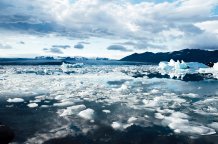Articles

Dr Ricarda Winkelmann said temperatures are already within the range of the estimated “point of no return” for the Greenland ice sheet.
Some polar tipping points ‘already passed’
Some tipping points that will cause vast quantities of polar ice to reach the ocean have already been passed, a top climate scientist says.
Dr Ricarda Winkelmann, of the Potsdam Institute for Climate Impact Research, also said the loss of “potentially unstable” ice regions in Antarctica alone could raise sea levels by 20 metres.
Speaking at the James Lovelock Centenary conference, organised by the University of Exeter’s Global Systems Institute, she said she hoped the rapid change already taking place in the Arctic and Antarctica could serve as an “early warning system”.
This could lead to “societal tipping points” after which human attitudes and actions change for the better, she said.
“We all should care about ice sheets,” Dr Winkelmann said.
“It’s important to understand that there are these critical thresholds.”
She said temperatures are already within the range of the estimated “point of no return” for the Greenland ice sheet.
In Antarctica’s Amundsen Basin – home to enough ice to raise global sea levels by a metre – a tipping point has already been passed, destabilising the ice and increasing the rate glaciers flow into the sea.
Dr Winkelmann said this destabilisation has started a process and “most of the ice in this region [around the basin] will follow”.
It is not clear how long this will take, she said, but she argued it should prompt rapid action to limit carbon emissions.
Also at the conference, Tim Flannery, chief councillor of Climate Council Australia, said seaweed farms in the open ocean could draw carbon from the atmosphere and help limit climate change.
Given the scale of the problem, farms would have to cover massive areas – several times the size of Australia – and he said many questions remain about the effectiveness and possible consequences of this idea.
Date: 30 July 2019
